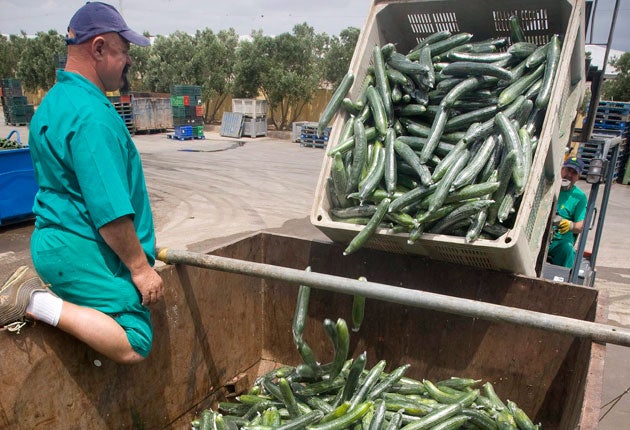Fears grow as E.coli outbreak is traced to new strain of bacteria
The use of manure as a fertiliser could have led to contamination of vegetables which ingest the bacteria as they grow

The E.coli bacterium responsible for a deadly outbreak of disease in Germany that has left 18 people dead was revealed yesterday to be a new virulent strain, fuelling alarm across Europe.
Russia extended its ban on the import of vegetables from Germany and Spain to the entire European Union – a move condemned by the EU as disproportionate – while scientists said the new strain was similar to one isolated in the Central African Republic known to cause serious diarrhoea.
The World Health Organisation (WHO) said preliminary genetic sequencing suggested that the cause of the outbreak was a mutant form of E. coli that appeared to be particularly aggressive, resulting in widespread severe disease and deaths.
More than 1,500 people have been seriously affected, with at least 470 developing a severe complication-causing kidney failure. Most of them are in Germany but at least 10 countries have reported people falling ill. In the UK, seven people have been hospitalised including three Britons who recently visited Germany and a German person on holiday in England.
Hilde Kruse, a food safety expert at the WHO, told the Associated Press that the new strain had "various characteristics that make it more virulent and toxin-producing" than existing strains. "This is a unique strain that has never been isolated from patients before," she said.
However, she stressed that milder cases were unlikely to seek medical help so it was impossible to know how big the outbreak was or what proportion were severely affected.
E. coli outbreaks have previously hit children and the elderly hardest and are usually linked with the consumption of meat and meat products, especially beef. The European outbreak is disproportionately affecting adults, especially women, and has been linked with raw salad vegetables.
Experts said there might be something particular about the strain that makes it more dangerous for adults. The use of manure as a fertiliser could have led to contamination of vegetables.
The UK Health Protection Agency (HPA) said consumers should thoroughly wash or peel all salad and fruit before eating. But Dr Nicola Holden, of the James Hutton Institute, said washing may not be enough. She said the outbreak could be an indication that fruit and vegetables are ingesting the bacteria as they grow.
"The bacteria are able to get from animal sources on to crops through different routes, most likely in irrigation water or sometimes from slurry spraying, while some contamination can also occur during processing and packaging," she said. The source of the outbreak remained a mystery yesterday. German officials have warned people not to eat lettuce, tomatoes and cucumbers, fanning uncertainty about the safety of the vegetables across Europe.
They had initially singled out Spanish cucumbers as the culprits but these were later cleared, prompting protests from Prime Minister, Jose Luis Rodriguez Zapatero, who said yesterday the government would demand "explanations and reparations" from Germany and the EU.
Spanish farmers say their credibility has been ruined by the accusations. In Valencia, angry farmers dumped 300kg (700lbs) of cabbages, tomatoes, peppers, cucumbers and other produce outside the German consulate.
E. coli exists naturally in the gut but a group of the bacteria called verocytotoxin can cause serious illness. In the UK there have been fatal disease outbreaks in Wales and Scotland and at Godstone Farm, Surrey, in 2009.
Subscribe to Independent Premium to bookmark this article
Want to bookmark your favourite articles and stories to read or reference later? Start your Independent Premium subscription today.

Join our commenting forum
Join thought-provoking conversations, follow other Independent readers and see their replies